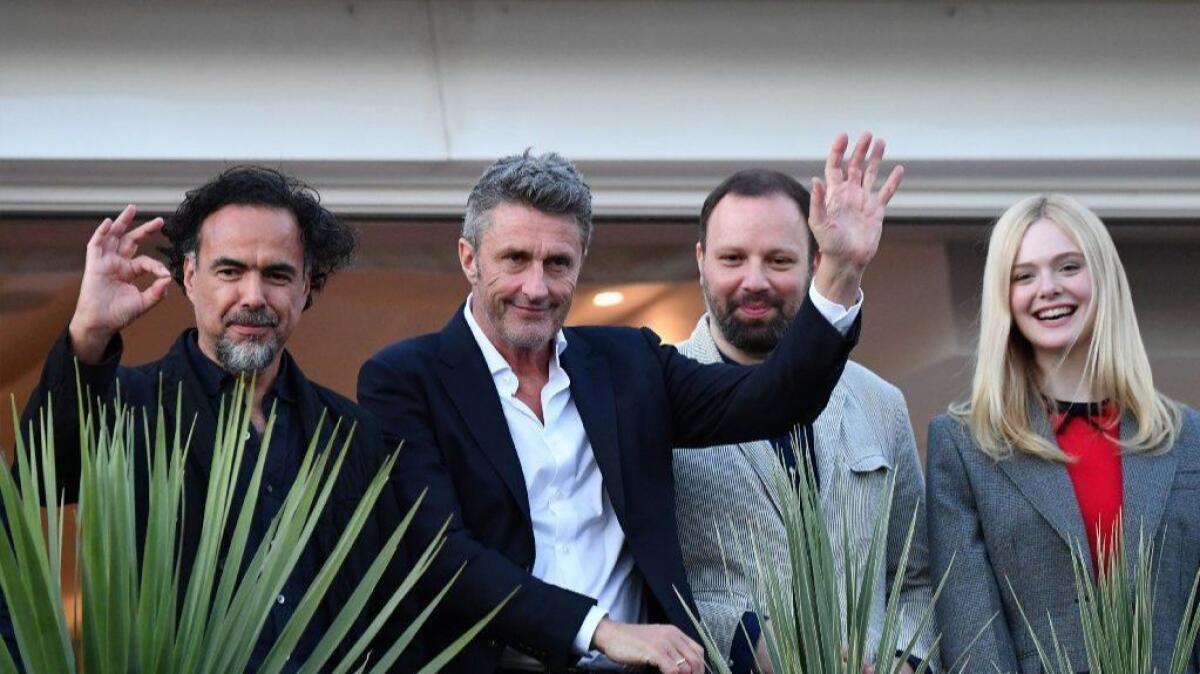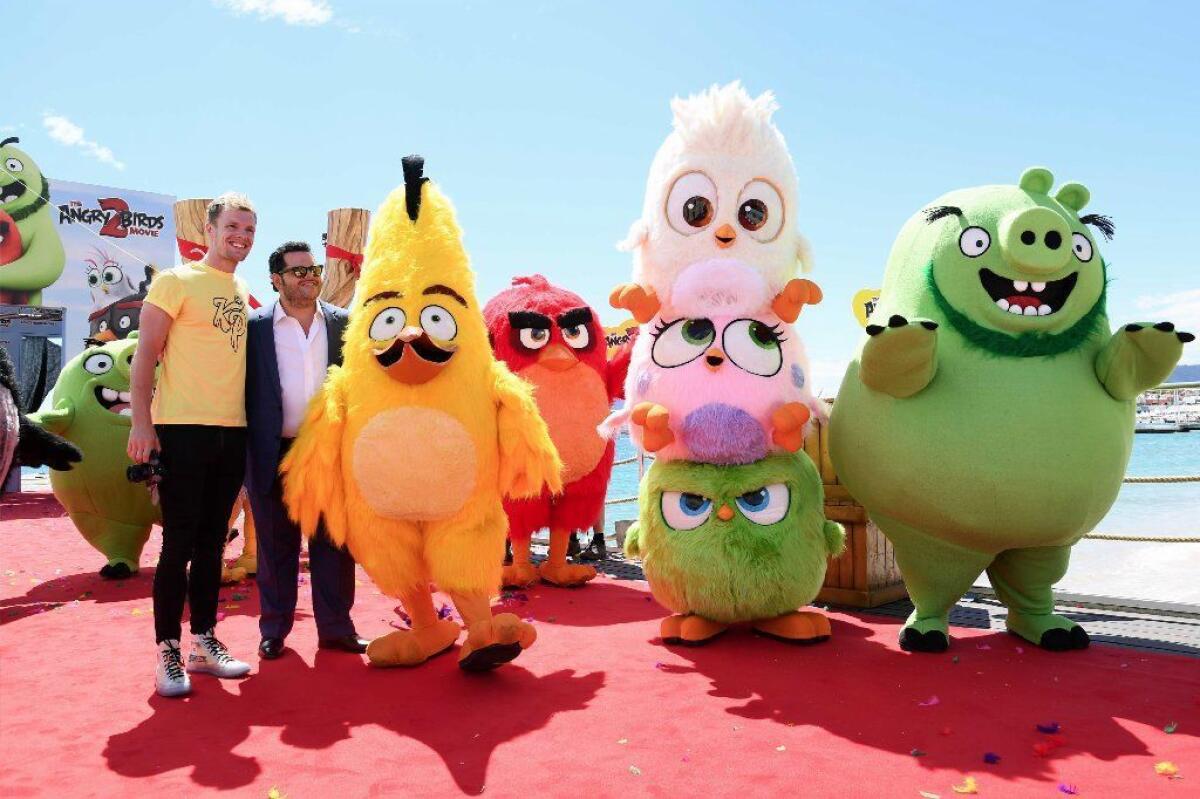Cannes Film Festival rebounds with bigger names, but less frenzy on the ground

- Share via
Reporting from Cannes, France — What a difference a year makes. Or does it? With the preeminent cinematic event that is the Festival de Cannes, both ways is the way it’s always going to be.
Cannes 2018 was not a high point for the fest, which will launch for the 72nd time Tuesday night. The Netflix kerfuffle and a scarcity of female directors and top American films led to headlines like the one in Variety which proclaimed, “Fall Festivals Eclipse Cannes.”
Though the standoff with Netflix continues, Cannes 2019 has taken steps to remedy the other situations, shaking things up in ways large and small and even changing the designation of the final movie shown from “Closing Film” to “Last Screening.”
Four films by women, tying a Cannes record, are in competition, including “Portrait of a Lady on Fire” by France’s Céline Sciamma, who directed the excellent “Girlhood,” and the Senegal-set feature debut “Atlantique,” directed by Mati Diop. If her name sounds familiar, her uncle was the great Sengalese director Djibril Diop Mambéty.
As far as American films, marquee value auteurs are certainly represented, including Quentin Tarantino’s much anticipated “Once Upon a Time … in Hollywood” and “A Hidden Life,” a new drama from Terrence Malick about a conscientious objector in Nazi Germany.
And then there is Jim Jarmusch, whose ensemble zombie comedy “The Dead Don’t Die” opens the festival Tuesday with stars including Bill Murray, Adam Driver, Tilda Swinton and Selena Gomez and is being promoted in France with the tagline “A Cast to Raise the Dead.”
Room has even been found for American directors usually found at Sundance. Ira Sachs (“Love Is Strange”), for instance, is in competition with the Isabelle Huppert-starring “Frankie,” while Robert Eggers, last seen with “The Witch,” brings his sophomore effort “The Lighthouse” — starring Willem Dafoe and Robert Pattinson — to the parallel Directors Fortnight event.
As to the kind of world cinema big names who are a regular feature at the festival, this year also has a strong collection. Among the most talked about returnees are:
Spain’s Pedro Almodóvar with the quasi-autobiographical “Pain and Glory” starring Antonio Banderas;
France’s Arnaud Desplechin with “Oh Mercy!,” a policier set, as many of his recent films have been, in his birthplace of Roubaix;
Belgium’s Dardennes brothers with “Young Ahmed,” a drama about extremism that is already causing controversy;
Britain’s multi-Palme d’Or winning Ken Loach with another drama of the dispossessed, “Sorry We Missed You.”
Equally anticipated, though it is showing out of competition, is the new documentary by Asif Kapadia, who made the marvelous “Senna” and won an Oscar for “Amy.” His current subject, “Diego Maradona,” focusing on the mercurial soccer legend, promises to be revealing.
But all the anticipation and bold-faced names have not stopped the naysayers, as you might say, dead in their tracks, and not everyone is convinced the Cannes crisis is over.
French magazines that might have put Cannes on their covers seem to have gravitated instead to Meghan, Harry and baby Archie, and one French newspaper ran a major Sunday story headlined, “Cannes, Fragile Star,” noting how the festival struggles to “preserve equilibrium between the dream factory and quality films.”
Even at ground zero — the few blocks surrounding the Grand Palais where everything takes place — there is less excitement, far fewer posters advertising festival selections or forthcoming studio films.
In their place often are advertisements, large and incongruously in English, spreading the word about festival corporate sponsors including MasterCard (“See The World Through a Different Lens”) and the telecommunications giant Orange (“Film Brings You Emotion, Orange Brings You Film.”)
Even the front of the Carlton Hotel, usually a jungle of competing ads, features only one film this year — the Elton John biopic “Rocketman,” a splashy Hollywood title that has its world premiere at the festival out of competition.
On the other hand, striking a blow for commercialism and old fashioned promotion was, of all things, “The Angry Birds Movie 2,” which organized a parade around the Palais of about a dozen folks in life-size angry bird costumes. (In truth, they didn’t look all that angry, but it was fun to have them around.)

All this aside, there is more to Cannes than the screening of new films. There is the ever-growing Cannes Classics section, which features restorations of the widest variety of cinema, from “Hakujaden,” the first Japanese animated movie in color, to Jean Grémillon’s 1944 “Le Ciel Est à Vous,” a classic of French cinema under German occupation.
Cannes also holds live tributes and interviews, bringing to the stage this year a group that includes Alain Delon (whose honorary Palme has sparked controversy, even in the U.S.), Sylvester Stallone and Chinese actress Zhang Ziyi. Director and film authority Bertrand Tavernier will be talking about French movie composers.
By the luck of the draw, that balancing act between art and commerce — that determination to remain relevant — is reflected in this year’s poster.
It’s a shot of the late director Agnès Varda engaged in a balancing act of her own, standing precariously on the back of a technician high above a city while shooting her first feature, “La Pointe Courte,” in 1954.
In its own way, it’s a kind of “Fiddler on the Roof” moment: a vision of Cannes’ determination, as the opening of that musical would have it, to emulate the fiddler who is “trying to scratch out a pleasant, simple tune without breaking his neck.” The tune may no longer be simple, but the will remains the same.
More to Read
Only good movies
Get the Indie Focus newsletter, Mark Olsen's weekly guide to the world of cinema.
You may occasionally receive promotional content from the Los Angeles Times.










